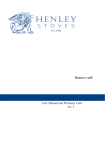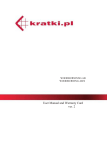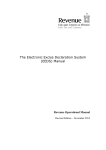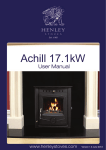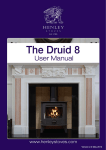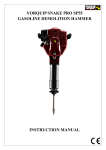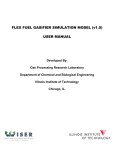Download Woodburning Zurich Cast Iron Woodburning Zurich
Transcript
Woodburning Zurich Cast Iron WOODBURNINNG AB Woodburning Zurich Steel WOODBURNING AB/S User Manual and Warranty Card ver. 2 WOODBURNING AB Woodburning Zurich Cast Iron Dimensions of the oven - Woodburning AB 2 WOODBURNING AB/S Woodburning Zurich Steel 3 General Information WARNING! To avoid the fire hazard, the device must be installed in accordance with the applicable standards and technical regulations, which are mentioned in the further part of the manual. The installation must be performed by a professional and qualified staff. The device complies with the EN 13240 standard and has the CE certificate. Freestanding stoves are designed to burn wood from deciduous trees. They are used for heating houses and spaces, in which they are installed. They can be used as an additional source of heat energy. Before installation, read the attached user manual. After unpacking check the completeness of the device and the operation of its moving parts: primary air control mechanism (at the door), door functioning mechanism (hinges, handle). The device has to be installed in accordance with the applicable standards of the construction law. Installation of the stove should be performed by the installer. The manufacturer is not liable in the case when the installation is contrary to the applicable regulations and standards (construction regulations, national and local regulations), which must be followed. The stove has to be set at a safe distance from any flammable products. There may be a need to secure the wall and the materials surrounding the stove. The free-standing stove should be set on the non-flammable surface with sufficient capacity. If the ground is not adapted for supporting the weight of the stove, the appropriate undertakings should be performed to improve the bearing capacity (e.g. the use of plates spreading the load on a greater surface).. Construction Construction of the stove - WOODBURNING AB Top or rear outlet of gases System of two deflectors – steel and Acumotte - which increases the exhaust path Triple system of airing the combustion chamber: primary and secondary air and the air curtain (system of clean glass) Combustion chamber is lined with ceramic Acumotte 25mm thick Air regulator Built-in air intake connector fi 100 mm Regulation of primary air intake under the grate Chamber under the furnace is equipped with “push to open” mechanism – opening by pressure Moving, rotating cast iron grate 4 Specifications. Specifications Stove AB Stove AB/S 8 8 5,5 - 10,5 5,5 - 10,5 Flue diameter (mm) 150 150 Thermal efficiency (%) 78 % 78 % 0,08 % 0,08 % Flue has temperature (°C) 275 275 Weight (kg) 145 126 Billet length (mm) 250 250-350 Rated output (kW) Scope of heating power (kW) CO emission (with 13% O2) ≤ See also the label on the oven. Construction material: Cast iron/Steel Stole elements made of steel designed for operation at elevated temperatures, steel elements cut by laser, and then bent at the bending machines CNC and rolled. The body is welded using a welding robot, in the shield of noble gas, what provides good quality of welds. Woodburning Zurich List of steel elements WOODBURNING AB:Cast Iron - combustion chamber - body - handle - air intake connector - deflector - drawer Cast iron stove elements Zurich List of cast iron elements Woodburning WOODBURNING AB:Cast Iron - panoramic doors - top plate - moving rotating grate - bottom plate (combustion chamber floor) - exhaust gas inlet connections - end cap of the exhaust outlet Woodburning Zurich Steel List of steel elements WOODBURNING AB/S: - combustion chamber - body - handle - air intake connector - deflector - drawer - panoramic doors - top plate Cast iron stove elements Woodburning Zurich Steel List of cast iron elements WOODBURNING AB/S: - moving rotating grate - bottom plate (combustion chamber floor) - exhaust gas inlet connections - end cap of the exhaust outlet Additional elements: - lining the combustion chamber (Acumotte) with a thickness of 25mm, raises temperature in the furnace, contributes to the improvement of combustion parameters, influences the purity of combustion, burning harmful gases additionally limits the formation of soot on the glass of the stove - deflector Acumotte - panoramic fireplace glass – is made of heat-resistant ceramics, resistant to the temperature up to 800°C. - graphite rope for sealing glass - thermo rope for sealing doors 5 Spare parts If, after many years, it is necessary to replace some parts, contact with the seller or with any representative of our company. When ordering spare parts, you should provide information from the nameplate located on the back of the warranty card, which should be kept even after the expiration of guarantee. With these data and our factory documentation, the seller will be able to provide all spare parts in a short time. Chimney The standard stove has the upper discharge of flue gases, with an optional rear discharge of gases, after switching the connector of the exhaust. The free-standing stove should be connected to the chimney (flue). Specification of the minimal chimney draft for the nominal heat output [Pa]: The size of the chimney draft should be: - a minimum string - 6 ± 1 Pa; - average, recommended - 12 ± 2 Pa; - maximal - 15 ± 2 Pa. The chimney must be tight, and its walls smooth, before the connection it should be cleaned of soot and all contamination. The connection between the chimney and the device must be tight and made of non-combustible materials, secured against oxidation (e.g. enamel steel chimney pipe). If the chimney produced a weak string, we should consider new cables It is also important for the chimney not to produce excessive strings, so we should install the string stabilizer in the chimney. The alternative is also the special ending of the chimney regulating the power of the thrust. The control of the chimney should be ordered to the chimney master, and the potential modifications can be made by an authorised company, so that the requirements are met. Connection to the chimney ducts should be performed in accordance with the standard. The minimal effective height of flue chimney is 4-6mb. The length of connection of the device to the chimney should not exceed ¼ of the total height of the chimney. Examples of connections with the chimney. chimney flue incombustible material mortar rosette cleaner diameter of the connection with the chimney flue Ventilation in the room, where the stove is installed The stove for its operation uses air, therefore, it is required to provide the adequate ventilation of the room, where the device is installed. Inlet grills of the ventilation system in the room should be protected against self-closing. 6 Safety The stove should be set on the non-flammable ground with a thickness of at least 30mm. Easily flammable floor in front of the doors of the heater should be protected with a belt of non-combustible material with the width of at least 30cm. The stove and system connection elements of the flue outlet should be kept away from flammable, unprotected construction parts of the building at least 60cm, and from the ones protected with the plaster 25mm thick or other equivalent lining – at least 30cm. During all activities related to the maintenance and exploitation of the furnace one should remember that its steel elements can have high temperature, and therefore, for the operation one should use protective gloves. During the exploitation and use of the furnace, one should follow the rules, which provide basic safety conditions: - Familiarize yourself with the user manual of the heater and strictly observe its provisions; - The oven should be installed and started by the installer according to the safety rules - Do not leave things sensitive to temperature near the stove glass, do not extinguish fire with water, do not exploit the oven with a broken glass, near the oven there can be found flammable elements; - Items made of inflammable materials must be at the distance of at least 1,5m from the furnace; - Do not allow children in the vicinity of the furnace; - All repairs should be entrusted to the installer and use only the spare parts of the furnace manufacturer; - Any changes of the structure, installation rules, use rules, are not allowed without the written permission of the manufacturer; Fuel A free-standing stove is designed for burning wood of deciduous trees (oak, hornbeam, ash, beech, etc.) with a moisture content lower than 20% (seasoned wood in suitable conditions for at least 2 years). It is acceptable to use wood briquettes or lignite. It is unacceptable to burn wet wood (intensive soiling of the stove and emission of soot, as well as reduction of energy efficiency). It is forbidden to use any other fuel, among others, coal, coniferous wood, tropical wood and all liquid fuel. It is forbidden to burn any types of garbage and wood waste. Burning the stove with unacceptable materials can cause its damage and threat to the life and health of users (poisonous fumes of chemical substances). Woodburning Zurich Cast Iron Air circulation in the free-standing stove AB Hearth airing regulation Open Closed 7 Combustion chamber airing can be realised from the room or from the outside. The stove has a built-in air intake from the outside – intake nozzle fi 100mm. Primary air regulation for the grate takes place using one mechanism (regulator) located at the door. The furnace has a triple system of airing the combustion chamber, primary and secondary air. Separation of air to the combustion chamber takes place in the space (air chamber) under the plate – grate, where the burning takes place. Primary air is supplied under the grate located in the floor of the combustion chamber. Secondary air is supplied through a special channel (located on the rear wall of the stove), through the system of openings, to the combustion chamber. Secondary combustion consists of burning particles found in the smoke. The stove also has the system of air curtain. The air directed through the steering wheel “sweeps” the glass causing the fire and smoke to move away from it, what significantly reduces the deposition of soot. This is the way the air is supplied to the upper part of the combustion chamber, where takes place the burning of gases created in the process of wood burning, what limits the emission of the harmful c.o. to atmosphere. Air intake from the outside. The ways of connection. The first fire Before the first fire we should remove all stickers or parts of equipment, located in the hearth. During the first fire in the furnace, you should keep the minimal temperature. All materials must slowly adapt to the high temperature. During the first fires the stove produces a smell, caused by the burning of paint. This smell will disappear after a short time. During the secretion of the smell, you should always air the room, where the stove is located. 8 Important: Before lighting up a big fire, you should light up a small one two or three times. This will allow the furnace structure for the proper embedding, and the paint to harden. Normal burning and extinguishing the furnace To prevent the extraction of exhaust gases during the operation of the heater, the door should be closed all the time, except during ignition, fuelling and removing ash. During the ignition you should provide the maximal possible air flow. You should completely open the regulation of the primary air inflow. It is allowed to slightly open the door until the fire starts. When starting the fire with open door you cannot move away from the stove. You must not use flammable liquids, grease, or other inappropriate preparations facilitating the ignition. After the ignition, during the normal operation of the furnace, combustion parameters can be regulated using the primary air inflow regulation located under the door. With the completely open primary air regulation to the combustion chamber, the greatest amount of air is supplied under the hearth, so the fuel is intensively burned. The nominal parameters of the stove are obtained with the primary air damper open to the middle 50 %. The amount of fuel You should not feel the hearth completely with wood, the optimal amount of fuel is the one, which will fill the Combustion chamber up to 1/3 of its volume. Before adding wood, you should wait until the flames subside, you should not add wood into too much heat. Doors should be closed each time. After the prolonged use, it is recommended For the first ignition to be performed with a smaller power. Extinguishing Extinguishing takes place by closing off the primary air inflow, in such case you should wait for the spontaneous Burn out of the fuel. If you need to quickly extinguish the flame, the furnace chamber should be buried with dry sand or ash. It is unacceptable to extinguish fire by spraying it with water, it may damage the stove elements. Rules of maintenance The basis for the proper and safe operation of the furnace is the properly cleaned and maintained chimney. The user is obliged to clean the chimney according to the applicable regulations. The frequency of cleaning and maintenance depends on its isolation and on the type of the used wood. The use of not seasoned wood with moisture greater than 20% or softwood will cause the risk of fire of soot in the chimney due to the deposition of a thick layer of combustible creosote, which should be regularly removed. The layer of creosote which was not removed inside the chimney damages the seal, and it contributes to the formation of corrosion. Therefore, there is a need of the periodic control and maintenance of the stove and elements cooperating with it. Cleaning the glass The glass is heated to high temperatures, so its cleaning should take place when the furnace is cooled down. For cleaning you should only use measures for this purpose, certified. Do not use abrasive measures for this purpose. Door/Seals The friction surfaces of the door hinges and the closing mechanism should be lubricated with graphite grease occasionally. Before each heating season you should perform the review and cleaning of the whole stove. You should pay special attention to the condition of the seals, replace them if necessary. 9 Removing ash Regular emptying of the furnace from ash prevents the leakage of ash outside. You should not allow for the ash to spill out the fence. Ash should be removed from a cold stove. WARRANTY CONDITIONS The buyer is obliged to read the user manual and warranty conditions written in the warranty card/user manual at the time of purchase of the product. Scope of warranty The manufacturer ensures the smooth operation of the device in accordance with the technical conditions of the operation included in this warranty. The use of the stove, the way of connection to the installation and the exploitation conditions must be in accordance with this user manual. The installation of the device should be performed by the installer. The warranty includes the free repair of the device within 5 years from the date of purchase. Claims arising from the warranty arise from the date of the purchase of the device. While they cease on the last day of warranty of the given product. The warranty does not cover: - the glass - defect caused by: mechanical forces, pollution, alterations, structural changes, activities connected with the maintenance and cleaning of the device, the chemical factors, the weather factors (discolorations, etc.), improper storage, - unauthorised repairs, transport via the shipping company or mail, incorrect operation of the device, In the above cases, the warranty claims will be rejected. Reporting a defect under warranty, the customer is always required to sign a declaration that he did not use Coal or other prohibited fuels for burning. If there is a suspicion of the use of the above mentioned fuels, the stove will be subjected to the expertise analysing the presence of the prohibited substances. In case when the analysis shows their use, the customer will lose any rights to warranty and it obliged to cover all costs connected with the claim (also the costs of expertise). If another fuel is allowed, the information will be placed on the nameplate. The implementation of customer’s rights is done by: the repair or free replacement of parts considered defective by the manufacturer, the removal of other defects existing in the device, the term “repair” does not include the operations mentioned in the user manual (maintenance, cleaning), to which the user is obliged on his own, a claim disclosed during the warranty will be considered by the manufacturer within 14 days from the written notification, provided that the necessary documents are provided. The warranty card is valid when: It was properly filled in, contains the date of sale, stamp and signature of the company, installer. There is an agreement of the purchase date on the warranty card with the purchase date on the receipt or the invoice copy. The manufacturer company KRATKI.PL rejects any liability for damages resulting from any modifications of the device and any modifications of the rest of the installation by the user. In order to constantly improve the quality of own products KRATKI.PL reserves the right to modify devices without prior notice. 10 Exhaust connector pipe woodburning stove AB Woodburning Zurich Cast Iron Flue outlet connection The end cap in the rear wall of the housing Exhaust outlet cap Rear plate of the hearth body Upper cover of the furnace Top plate of the hearth body The end cap of the top plate 1. Remove the top cover from the furnace. 2. Remove the connector of the exhaust outlet from the top plate of the hearth body. 11 3. Cut a hole end cap in the rear steel casing of the stove. 4. Remove the cap of the exhaust outlet at the back of the hearth body. 5. Insert the flue outlet plug and screw it to the top plate of the hearth body. 12 6. Screw the flue outlet connector to the back of the hearth body (in place where the exhaust outlet end cap has been previously located). 7. Place the top cover on the chimney, and the additional element – the top cover end cap (it is not the part of the stove equipment). 13 8. The flue outlet connection after the insertion from the top flue exhaust to the rear. 14 SELLER Name: Stamp and signature of the seller; Address: Tel/fax: Date of sale: BUYER OF THE STOVE A free-standing stove should be installed according to the applicable regulations and provisions in the given country, with the provisions of the user manual by the installer who has the appropriate permissions. Date and legible signature of The buyer; I declare that after reading the user manual and warranty conditions, in the case of non-compliance to the provisions included in them, the manufacturer shall not be held liable under the guarantee. INSTALLER OF THE STOVE Name of the installer’s company: Installer’s address: Tel/fax: Launch date: I confirm that a free-standing stove installed by my company meets the requirements of the user manual, is installed according to the applicable subject matter standards, provisions of the construction law, fire provisions. Stamp and signature of the installer; The installed furnace is ready for the safe use. SERVICE COVERAGE 15 REGISTER OF THE SMOKE OUTLET MAINTENANCE Overview during the installation of the furnace Overview during the installation of the furnace Overview during the installation of the furnace Overview during the installation of the furnace Overview during the installation of the furnace Overview during the installation of the furnace Overview during the installation of the furnace Overview during the installation of the furnace Overview during the installation of the furnace Overview during the installation of the furnace Overview during the installation of the furnace Overview during the installation of the furnace 16 Overview during the installation of the furnace Overview during the installation of the furnace 17 Henley Stoves, Curraheen, Tralee, Co. Kerry, Ireland Tel: 066 7119788 | Fax: 066 7124200 | Email: [email protected] | www.henleystoves.com


















